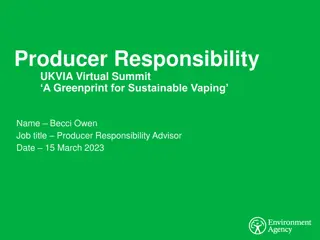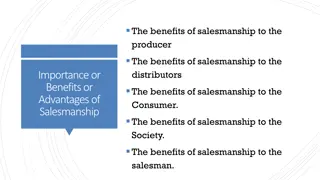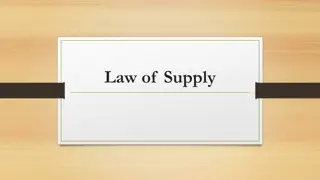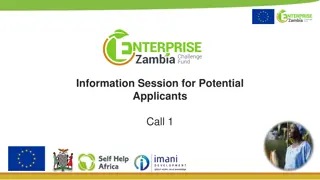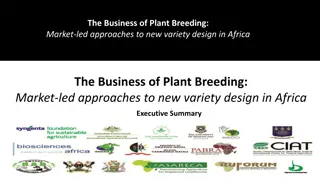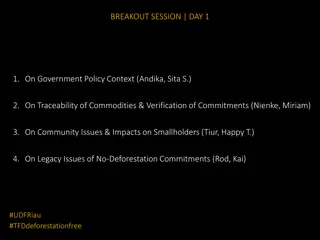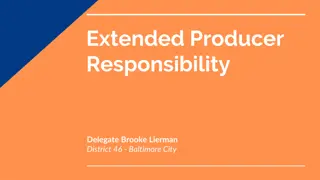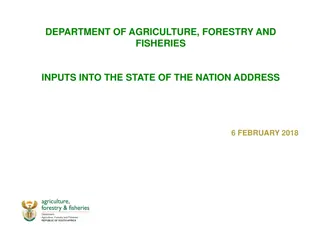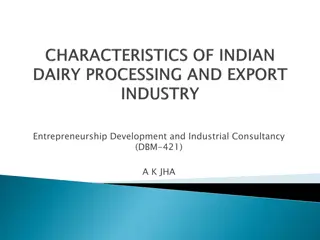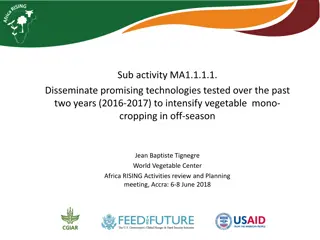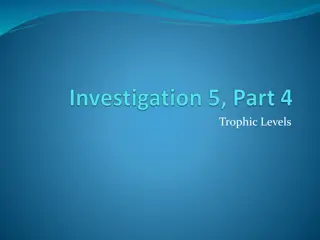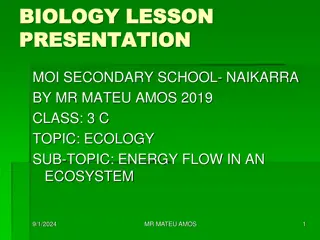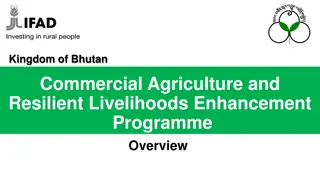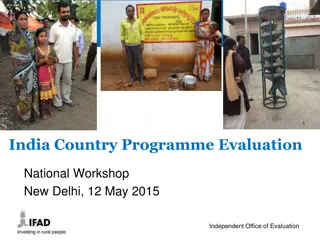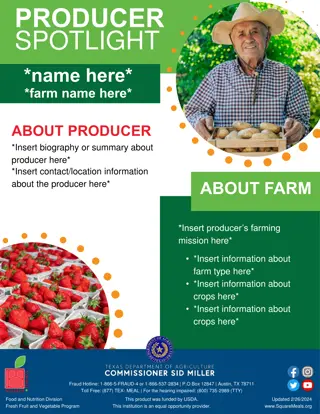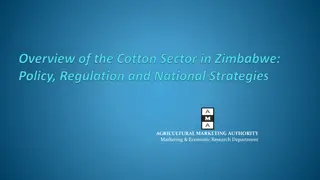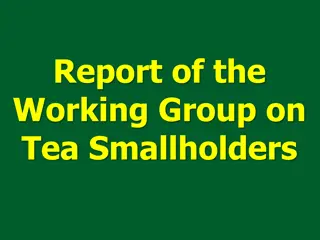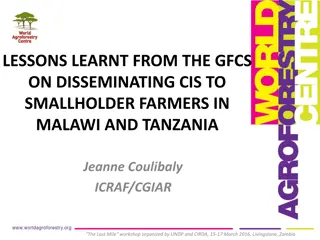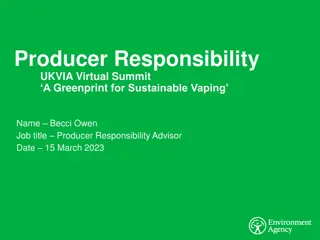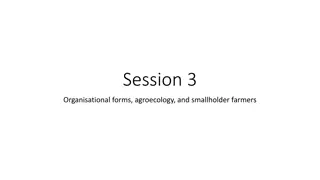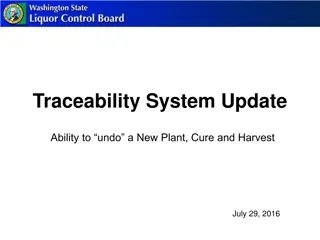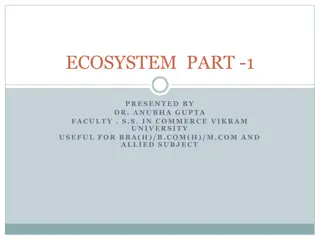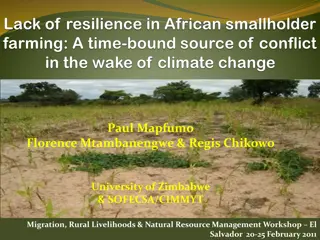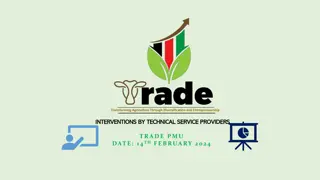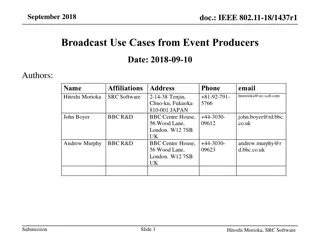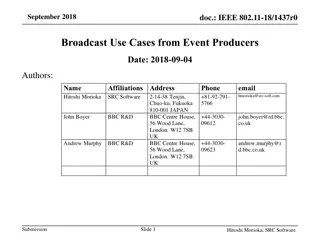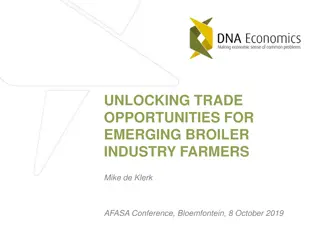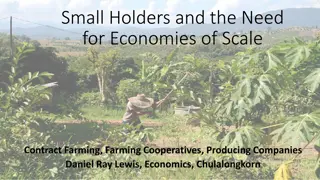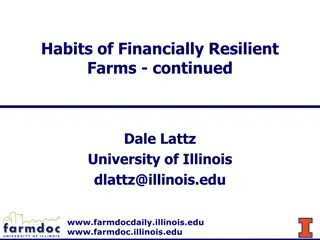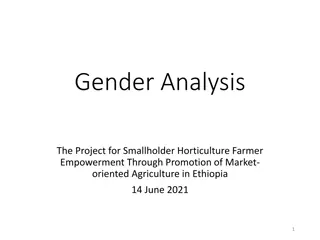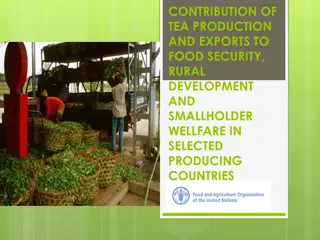Determinants of Maize Yield Variation in Zambian Smallholder Farming
Explore factors influencing maize productivity in Zambia, aiming to enhance smallholder agricultural efficiency. Investigate yield differences at distinct points using panel quantile regression. Objectives include assessing input profitability and strategies for boosting maize output.
0 views • 14 slides
Agricultural Roads Improvement Program Overview
The Agricultural Roads Improvement Program (ARIP) is a one-time grant initiative funded with $150 million to improve deteriorating Class B and weight-restricted roads hindering agricultural operations. Eligible projects must provide access to agricultural lands, involve agricultural producers, and a
5 views • 7 slides
Seminar on Producers Organizations and Cooperatives
This seminar focuses on the concept of Producers Organizations (POs) and cooperatives, highlighting the role of extension services in strengthening these entities. It covers the establishment steps, reviews related studies, and emphasizes the benefits of POs for rural producers. The essential featur
0 views • 71 slides
Understanding Producer Responsibility in UK: Regulations for Sustainable Vaping
Producer Responsibility in the UK entails businesses taking accountability for the environmental impact of their products, including packaging, electrical equipment, batteries, and end-of-life vehicles. This responsibility extends to vapes as they fall under the Waste Electrical and Electronic Equip
0 views • 10 slides
The Benefits of Salesmanship in Marketing and Society
Salesmanship plays a crucial role in connecting producers, distributors, consumers, and society at large. It enhances demand for new products while maintaining customer satisfaction, reputation, and cost-efficiency for producers. Distributors benefit from increased demand, simplified distribution, a
2 views • 6 slides
Understanding the Law of Supply in Economics
The Law of Supply states that as the price of a good or service increases, the quantity supplied by producers also increases, assuming all other factors remain constant. This fundamental economic principle highlights the relationship between price and supply, emphasizing how producers strive to maxi
1 views • 4 slides
Enterprise Zambia Challenge Fund - Supporting Sustainable Agriculture
Enterprise Zambia Challenge Fund, implemented by Self Help Africa with support from the European Union and the Government of Zambia, aims to integrate smallholder farmers into sustainable value chains in Zambia. The project provides economic, nutrition, and technical support to agri-enterprises, wit
0 views • 51 slides
Market-Led Approaches to Plant Breeding in Africa
Africa's agriculture is transitioning towards market-led systems, with smallholder farmers producing surpluses for growing demands. The focus is on quality, safety, and meeting market requirements to access expanding markets. Adoption of new crop varieties in Africa is around 35%, contrasting with h
0 views • 61 slides
Discussions on Zero-Deforestation Commitments in Palm Oil Industry
The breakout sessions on government policy context, traceability, community issues, and legacy issues in the palm oil industry provide a platform for in-depth discussions. Topics range from impediments to zero-deforestation commitments to challenges in traceability and verification processes, commun
0 views • 5 slides
Understanding International Distribution Channels
In the modern era of large-scale production and specialization, producers face challenges in distributing their goods to consumers. International distribution channels play a crucial role in connecting producers with consumers through various intermediaries. Definitions by Philip Kotler, Richard Bus
1 views • 5 slides
Extended Producer Responsibility in Maryland: A Framework for Sustainable Waste Management
The Extended Producer Responsibility (EPR) program in Maryland, spearheaded by Delegate Brooke Lierman in District 46, Baltimore City, aims to reduce waste by holding producers accountable for the entire life cycle of their products. Covered products include packaging, containers, consumer goods, an
4 views • 9 slides
Agriculture, Forestry, and Fisheries: State of the Nation Address 2018 Review
The Department of Agriculture, Forestry, and Fisheries presented insights into the state of the nation in 2018, focusing on the revitalization of the agriculture and agro-processing value chain. Key challenges discussed include land transfer, declining household involvement in agriculture, and input
0 views • 21 slides
Challenges and Opportunities in the Indian Dairy Industry
The Indian dairy industry is characterized by the dominance of smallholder milk producers, with over 150 million farmers involved in production. Despite being the largest milk-producing country, India faces challenges such as low productivity of milch animals and the need for quality control mechani
0 views • 13 slides
Regional Project Proposal to Enhance Climate Resilience in Pakistan, Mongolia, and PRC
This proposal outlines a regional project focusing on enhancing climate resilience and agricultural productivity in Pakistan, Mongolia, and the People's Republic of China (PRC). The project aims to increase access to credit for smallholder farmers, promote climate-smart agriculture technologies, and
0 views • 12 slides
Enhancing Vegetable Farming Practices in Ghana's Upper East and Northern Regions
Dissemination of tested technologies to intensify vegetable mono-cropping in off-season, focusing on adapting crop and livestock practices to enhance smallholder productivity. Activities include identifying adapted vegetable varieties, conducting trials, and documenting farmer preferences. The proje
3 views • 16 slides
Exploring Trophic Levels and Energy Flow in Ecosystems
Understanding trophic levels and energy flow in ecosystems is vital for comprehending the intricate relationships between producers, consumers, and decomposers. Energy enters the food web through producers, transferring from one trophic level to another. Explore the dynamics of Mono Lake ecosystem a
0 views • 19 slides
Understanding Energy Flow in Ecosystems: A Comprehensive Overview
Energy flow in an ecosystem involves the transfer of energy from producers to consumers through different trophic levels, with only a small fraction of energy being passed on at each level. This process is essential for sustaining life within an ecosystem, highlighting the interconnectedness of all
0 views • 11 slides
Enhancing Agricultural Resilience and Livelihoods in Bhutan
The Kingdom of Bhutan Commercial Agriculture and Resilient Livelihoods Enhancement Programme (CARLEP) aims to increase smallholder farmers' incomes and reduce poverty through climate-resilient agricultural production. CARLEP builds on IFAD's longstanding partnership with the Royal Government of Bhut
1 views • 19 slides
Fair and Alternative Trade: A Path to Ethical Consumption
Fair Trade and Alternative Trade practices aim to create a more equitable and just global marketplace. Fair Trade focuses on fair prices and relationships for producers, while Alternative Trade emphasizes partnership and respect between producers and consumers. Through these approaches, consumers ca
0 views • 19 slides
IFAD-India Partnership: Enhancing Livelihoods and Empowerment
The IFAD-India cooperation has been instrumental in supporting rural development projects since 1979, focusing on empowering tribal communities, smallholder farmers, women, and youth. The evaluation of the country programme highlights the strategic objectives and innovative approaches implemented to
0 views • 21 slides
Spotlight on Local Producers and Fresh Vegetables
Learn about local producers and their farming missions, along with the nutritional benefits of fresh vegetables. Discover fun facts and activities related to veggies while supporting community sustainability. Contact information and resources for the Fresh Fruit and Vegetable Program are also provid
0 views • 6 slides
Overview of Cotton Production and Value Chain in Zimbabwe
Cotton production in Zimbabwe plays a crucial role in improving rural livelihoods and the economy. Over 200,000 smallholder farmers are engaged in cotton production, making it a significant source of income, employment, and export earnings. The cotton value chain involves various players like farmer
0 views • 13 slides
Strengthening Tea Smallholders Sector: Challenges and Solutions
Tea smallholders play a crucial role in the global tea sector, facing challenges like price realization and quality standards. Efforts such as the Confederation of International Tea Smallholders (CITS) aim to address these issues by providing a platform for policy development, market access, communi
0 views • 12 slides
Enhancing Climate Information Dissemination to Smallholder Farmers in Malawi and Tanzania
Lessons learned from the Global Framework for Climate Services (GFCS) on disseminating Climate Information Services (CIS) to smallholder farmers in Malawi and Tanzania highlighted the importance of multi-stakeholder partnerships in improving access to climate information. The advantages include a ho
0 views • 14 slides
Producers' Responsibility in Sustainable Vaping: Regulations and Compliance Guide
Understanding producer responsibility in the vaping industry is crucial for ensuring sustainable practices. Producers are accountable for the end-of-life impact of their products, including packaging, electrical equipment, batteries, and vehicles. This article covers the regulations surrounding Wast
1 views • 10 slides
Margin Protection Program for Dairy Producers: Overview and Insights
This article discusses the Margin Protection Program for Dairy Producers, how it works, the key operating rules, and the implications for dairy farmers. It also highlights the role of the National Program on Dairy Markets and Policy in providing educational resources and research materials. Addition
0 views • 26 slides
Understanding Farmer Organizations and Smallholder Farmers in Agroecology
Exploring various types of farmer organizations, their purposes, and impacts on smallholder farmers in agroecology. A discussion on organizational forms, interventions, challenges faced by smallholders, and the importance of collaboration in achieving collective benefits.
0 views • 15 slides
Assist with Undoing New Plant Creation, Cure, and Harvest Operations
The newly added functionality in the traceability system now enables producers to easily undo new plant creations, curing, and harvesting processes. This comprehensive guide explains step-by-step instructions on how to reverse these actions using the WSLCB Traceability System Interface. With clear v
0 views • 11 slides
Understanding Ecosystems: Components and Interactions
An ecosystem, as explained by Dr. Anubha Gupta from Vikram University, is a community of living organisms and their nonliving environment components working together. The ecosystem comprises biotic and abiotic elements, with producers, consumers, and decomposers playing vital roles in maintaining ba
0 views • 12 slides
The Creative World of Film Producers and Independent Filmmakers
Delve into the intricate art of continuity editing, producer roles, and the evolving landscape of independent filmmaking. Explore the rules that govern storytelling coherence and visual rhythm, the dynamic responsibilities of producers in film production, and the ambition driving independent produce
0 views • 20 slides
Enhancing Resilience in African Smallholder Farming: A Collaborative Approach
The project, led by the University of Zimbabwe in partnership with SOFECSA and the University of Wageningen, aims to address the lack of resilience in African smallholder farming to climate change pressures. Focused on sustainable food security and livelihoods in Southern Africa, initiatives such as
0 views • 31 slides
Enhancing Agriculture Through Diversification and Entrepreneurship with Technical Service Providers
This initiative aims to transform agriculture by promoting diversification and entrepreneurship, focusing on various commodities like beef, honey, potato, soybean, and dairy products. Technical service providers engage in targeted districts to enhance the value chain, form win-win partnerships, and
0 views • 14 slides
Understanding Energy Roles in Ecosystems
Organisms in an ecosystem play essential roles in the movement of energy, with each having a specific function. Energy roles include producers, consumers, and decomposers, each contributing to the balance of energy flow and nutrient cycling. Producers, such as plants, algae, and some bacteria, creat
0 views • 36 slides
Wireless Solutions for Event Producers in BBC: A Case Study
This document outlines the use cases and benefits of implementing wireless solutions for event producers in the British Broadcasting Corporation (BBC). It discusses scenarios such as distributing content to waiting audiences, program monitoring for staff, and providing additional value at festivals.
0 views • 11 slides
BBC Event Producers: Broadcast Use Cases & Solutions
This document from September 2018 explores various broadcast use cases from event producers at the BBC. It discusses the challenges faced during public events like festivals and premieres and suggests solutions leveraging Wi-Fi technology to enhance audience experiences, staff operations, and overal
0 views • 10 slides
Unlocking Trade Opportunities for Emerging Broiler Industry Farmers - AFASA Conference Presentation
Mike de Klerk presented at the AFASA Conference in Bloemfontein, highlighting export opportunities and growth constraints for South African broiler industry farmers. The presentation explores main export opportunities for producers, challenges faced by small producers, and potential pathways for mar
0 views • 9 slides
Enhancing Smallholder Farming Through Economies of Scale and Cooperative Models
Smallholder farming in developing countries is crucial for food production and the livelihoods of many individuals. However, to compete effectively in the market, small farms need to adopt cooperative models, economies of scale, and advanced agricultural technologies. By forming farming cooperatives
0 views • 8 slides
Financial Resilience Habits on Illinois Farms: Insights from a Profitability Study
A study conducted on Illinois farms focuses on the financial resilience habits of successful producers, analyzing factors like farm size, labor force, tillage, planting, growing season, harvesting practices, and managerial attitudes. Survey data from 9 producers sheds light on common profitable prac
0 views • 21 slides
Understanding Gender Analysis in Smallholder Horticulture Farming Empowerment Project
The article discusses the concept of gender analysis within the context of a project aimed at empowering smallholder horticulture farmers in Ethiopia. It covers the differences between sex and gender, the purpose and methods of conducting gender analysis, and the utilization of its results. Practica
0 views • 24 slides
Tea Production and Exports Contributions to Food Security and Rural Development
Tea production and exports play a significant role in food security, rural development, and smallholder welfare in selected producing countries such as India, Kenya, and Sri Lanka. The earnings from tea exports contribute to income growth, foreign exchange, employment, and national economic growth.
0 views • 23 slides



